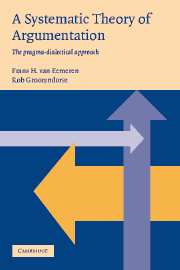2 - The realm of argumentation studies
Published online by Cambridge University Press: 12 January 2010
Summary
Argumentation theory as normative pragmatics
In order to get a clear idea of the different components of our approach to argumentative discourse, it is useful to start by having a closer look at the realm of the study of argumentation and offering a bird's-eye view of its various estates. In depicting these estates, and explaining their mutual relations, we not only do justice to the ecological diversity of the realm, but we also provide a systematic characterization of the crucial sub-divisions of the study of argumentation (van Eemeren 1987a).
We think that a fully fledged argumentation theory should combine insights acquired through rather different kinds of research. It is, in our view, the task of argumentation theorists to establish a well-considered link between, on the one hand, insights as they are expressed in normative models such as those of formal logic, and, on the other hand, insights derived from empirical descriptions as provided by discourse analysts that are primarily socially or linguistically oriented. The accomplishment of this task may run up against opposition on both sides. Perhaps out of fear of metaphysics or of “psychologizing,” present-day logicians tend to concentrate exclusively on formalized arguments that lack any direct relation with how argumentation is conducted in practice. Among social scientists and linguists, however, the view is still widely held that observations on argumentation (or other phenomena) are only of interest to science if they are based on empirical research – some social scientists are in practice even opposed to any theoretical reflection prior to the collection of data.
- Type
- Chapter
- Information
- A Systematic Theory of ArgumentationThe pragma-dialectical approach, pp. 9 - 41Publisher: Cambridge University PressPrint publication year: 2003



